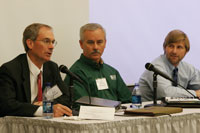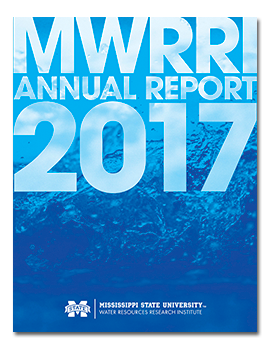Volume 1, Issue 2 April 2008
BIENVILLE NATIONAL FOREST
LAKE FEASIBILITY AND ECONOMIC IMPACT STUDY
Jon Rezek, Darren Hudson, Stephen Grado and Garen Evans
In an effort to reverse economic stagnation, the Bienville Resource Development Council (BRDC) proposed the construction of a 1,200-1,500 acre multipurpose surface water impoundment at the Oakohay Creek site located in northwestern Smith County. The Council represents the Mississippi counties of Smith, Covington, Simpson, Rankin, and Jasper. To understand the economic feasibility of such an undertaking, the Council contracted with the Mississippi Water Resources Research Institute. A multi-disciplinary team was constructed to include Institute scientists, and scientists in the Mississippi State departments of Agricultural and Biological Engineering, Finance and Economics, Forestry, Agricultural Economics and GeoSciences.
The first step in the study was to estimate the economic and fiscal impacts from residential activities at the lake. To accomplish this, a 2007 PricewaterhouseCoopers report was utilized to establish patterns of residential development expected near the proposed Smith County/Bienville National Forest Lake. To make estimates of the distribution of home values and associated household incomes of residents that would populate the proposed site, data from Lake Eddins was collected from the Jasper County Tax Assessor. Using the Impact Analysis for Planning software package, PricewaterhouseCoopers estimates were combined with Lake Eddins property tax data to determine economic impacts attributed by new residents. These economic impacts were used to gauge the value of the sales tax revenues generated by the project. A supplemental component of the residential analysis involved calculating the property tax implications.
In addition to the presumed residential activities, estimates from recreational activities planned at the lake and associated facilities were also needed. The PricewaterhouseCoopers report was used to estimate the recreationists expected visitors to the site. The team surveyed several recreational lakes in the state to estimate typical spending patterns by recreational visitors. Using IMPLAN, the combined visitor numbers and expenditure patterns were used to arrive at estimates of economic impacts of visitors on the region. Economic impacts were then used to extrapolate an estimate of the additional sales tax revenue expected from the project. Economic and fiscal impacts of recreational visitors, including second homeowners, were established. Finally the team looked at economic and fiscal impacts of public and private construction expenditures on the region.

Scientists found the proposed lake and associated residential and recreational activities, including business and infrastructure development, will generate $183 million (2006 dollars) in future sales. The major source of this revenue is from new residents and construction of the required infrastructure. Both activities will provide a significant economic stimulus to the region. These additional sales are expected to generate future income equivalent to about $51 million in 2006 dollars. This additional income largely accrues to the region's residents as a direct result of the lake construction, but also as a result of impacts from new permanent residents.
Visitors, both part-time residents and recreational visitors, will have a minor impact on the region. About 209 full- and part-time jobs will be created by the lake's economic stimulus. Most will come from the spending of new residents. These jobs, as well as those created by visitor spending are considered permanent jobs. Jobs created by the construction of the dam and related infrastructure were considered temporary. For comparison purposes, average number of jobs created each year were computed using construction expenditures. This average, 58 full- and part-time jobs, was highly skewed with approximately 385 full- and part-time jobs being created in year 1 of the project and only about 30 full- and part-time jobs being supported by construction during year 20, the last year under study.
FROM THE DIRECTOR

Welcome to the spring issue of the Mississippi Water Resources Research Institute newsletter. Spring is a great time of year to enjoy the abundant water supplies in Mississippi. Spring is also a great time to attend the Mississippi Water Resources Research Conference scheduled for April 15-16 in the accommodating Hilton Hotel, Jackson. The opening plenary session, Climatology Change and Water Availability, features National Oceanic and Atmospheric Administration's National Ocean Service Chief Ed Martin; Tom Armstrong, senior advisor for global change programs in the U.S. Geological Survey; state climatologist Charles Wax; and Auburn remote sensing expert Don Rodekohr.
Ten sessions will cover topics including Delta water resources, sedimentation, groundwater, coastal and wetlands, water supply, surface water quality, agriculture, modeling, and invasive species. During the two-day conference there will be over 30 presentations, a large poster session, and 10 national and regional leaders addressing important and timely water issues facing the state and nation. Conference sponsors include the state's Department of Environmental Quality and Public Service Commission, the Mississippi Water Resources Association, the Water Resources Research Institute at Mississippi State University, the U.S. Geological Survey, and the National Oceanic and Atmospheric Administration. Luncheon speakers are Brandon Presley, northern district public service commissioner on the 15th and Barbara Travis, executive director of the Mississippi World Trade Center on the 16th. Please visit the conference web page at www.wrri.msstate.edu/conference.php for information.
Institute staff have been busy this year. Planning for the spring conference and also co-hosting a fall conference with the Mississippi Public Service Commission. The conference "Water is the River of Life" was held in December on the Mississippi State campus. Over 150 attended the two-day conference which included focus sessions with local and state representatives discussing numerous issues facing North Mississippi. During the conference, outgoing Public Service Commissioner Bo Robinson was honored for years of dedication and hard work on behalf of the state. More details are available below in this e-newsletter.
The Advisory Board also met in November to discuss the mission and goals of the Institute. Board members reviewed proposals submitted for USGS funding and discussed strategic planning for securing additional state funds.
Please visit our web site and let us know about your water related research. Also, please consider coming to the conference. It is a great opportunity to network.

FUNDED RESEARCH PROJECTS
Projects funded by the MWRRI

Mary Love Tagert, assistant research professor has recently completed several research projects including the St. John's Bay and Jacksonville, Florida onsite wastewater system assessment, organization of a voluntary Luxapillila Creek Watershed Alliance, aquatic plant management support for the Pearl River Valley Water Supply District, LeFleur Lake, and improved prediction of surface water quality.
Se-Tac
Nearly a dozen proposals were submitted for Se-Tac funding. Now administered by Jonathan Pote and Amy Schmidt, past funding has yielded information for small water supply systems. Current projects include the Louisiana Rural Water Association conducting numerous visits to assist with completion of vulnerability assessments, the Tennessee Association of Utility Districts conducting workshops to assist managers in evaluating their water system, and the Alabama Rural Water Association completing a series of training sessions focused toward a proactive approach to emergency preparedness.
USGS Projects
Gregg Davidson at the University of Mississippi is in the final stages of his project. He has been developing a reliable method for identifying pre-settlement wetland sediment accumulation rates. He is beginning a new project at Hampton Lake, an oxbow lake in the Delta. Several cores have been collected, 180 samples digested and analyzed for a suite of element concentrations.
Mississippi State scientists Gary Ervin and Todd Tietjen continue collection in the Sunflower River, sampling for water quality and wetland integrity. They have identified a subset (20 sites) of the overall MDEQ Delta region IBI site on another project. In conjunction with the Yazoo MS Delta Joint Water Management District, chlorophyll samples have been collected and analyzed from more than 35 sites. Continuous temperature and dissolved oxygen measurements have been collected from approximately six additional sites in the Coldwater River Basin.
Charles Wax at Mississippi State has completed a prototype water use model using acreages, irrigation methods, and management strategies in Sunflower County to predict annual water demand for cotton, rice, soybeans, corn, and catfish.
INFORMATION REQUEST
WRRI Initiates Networking Group
The Institute held an informal meeting this past fall to offer an avenue for future collaboration on research projects as well as funding opportunities. Various Mississippi State departments were represented at the meeting including forestry, wildlife and fisheries, plant & soil sciences, civil engineering, and biological sciences. Scientists in the GeoResources Institute were also in attendance. A questionnaire was sent to those attending and others interested in this network to gather information on their experience, expertise, and publications. The questionnaire also sought to define areas of concentration. An 'experts' database will be developed from the information gathered.
Regional Survey Identifies Research Priorities for the Gulf of Mexico
Over 1,500 individuals completed the survey identifying research priorities in the Gulf of Mexico region. Survey respondents represented academia, government, non-governmental organizations and private sectors. The survey was conducted in association with the Gulf of Mexico Research Plan, which is sponsored by the National Sea Grant Program and the four Gulf of Mexico Sea Grant college programs (Mississippi-Alabama, Florida, Louisiana and Texas).
The Web-based survey asked respondents to identify the importance of broad research priorities that were defined in the Ocean Research Priorities Plan and Implementation Strategy. The top rated research priorities were:
- Understand and predict the impact of natural and anthropogenic processes on ecosystems;
- Understand human-use patterns considering economic, sociological and cultural factors that may influence resource stability and sustainability;
- Apply understanding of marine ecosystems to develop appropriate indicators and metrics for sustainable use and effective management;
- Understand interspecies and habitat/species relationships to support forecasting resource stability and sustainability; and
- Understand the status and trends of resource abundance and distribution through more accurate, timely and large-scale assessments.
A summary of the survey is available on the Web site http://www.masgc.org/gmrp/index.htm.
Contact Steve Sempier, Stephen.sempier@sum.edu or by phone at 662-325-5509 if you have any questions or comments.
Water is the River of Life Conference
The Institute was honored to co-host the "Water is the River of Life" conference in December. Partnering with the Mississippi Public Service Commission, 150 individuals attended the conference on the Mississippi State campus. Sessions and panel participants included:
- Water for Economic Development
Mike Armour, Appalachian Regional Commission
Bill Adams, Tennessee Valley Administration
Jack Moody, Mississippi Development Authority
Barbara Travis, World Trade Center
Al Tuck, Mississippi Department of Wildlife, Fisheries and Parks - Regional Water/Wastewater Concerns
Jamie Crawford, Mississippi Department of Environmental Quality
Keith Allen, Mississippi Department of Health
Mickey Plunkett, U.S. Geological Survey
Charlie Morgan, Mississippi Forestry Commission
- Political Panel moderated by Marty Wiseman of the John C. Stennis Institute of Government
Senator Hob Bryan
Starkville Mayor Dan Camp
Representative Tyrone Ellis
Nettleton Mayor Brandon Presley
Ackerman Mayor Bruce Burney
Amory Mayor Howard Boozer
- Tenn-Tom Waterway moderated by Deirdre McGowan of the Mississippi Rural Water Association
Don Waldon, Tenn-Tom Waterway Development
Tom Griffith, retired Tenn-Tom Director
Rick Saucer, U.S. Army Corp of Engineers
Bill McAnally, Civil and Environmental Engineering, Mississippi State University
Pontotoc Mayor Bill Rutledge
- Regional Approaches
Jeff Ballweber, Colorado State University
Chip Morgan, Delta Council
Dean Pennington, Yazoo Mississippi Delta Joint Water Management District
Kirby Mayfield, Rural Water Association
Jonathan Pote, Mississippi Agricultural and Forestry Experiment Station

Immediately following the first day of the conference a reception was held to honor Commissioner Bo Robinson for his years of work at the Public Service Commission and his dedication to water issues. Commissioner Robinson has served the public in positions including sheriff, tax collector, representative, and the northern district public service commissioner. During his tenure as commissioner, Robinson implemented Wise Consumer Workshops, Water Conferences, No Call Registration, and Internet Access to the Public Service Commission.
Sponsors for the event included Tombigbee River Valley Water Management District, Tennessee Valley Authority, and Coca-Cola Bottling Company of Northeast Mississippi. Entergy provided door prizes to conference attendees.
UPCOMING EVENTS
April 15-16, 2008. MWRRI 38th Annual Conference. Hilton Hotel, Jackson, Mississippi.
July 22-24, 2008. UCOWR/NIWR Annual Conference. Durham, North Carolina. "International Water Resources: Challenges for the 21st Century and Water Resources Education.
August 6-8, 2008. The Mississippi Water Resources Association will hold its annual meeting at the Hollywood Resort in Bay St. Louis, Mississippi. For more information, contact Deirdre McGowan at insightltd@msn.com.
Mississippi Water Resources Research Institute (MWRRI)
The institute exists as both a federal and a state research unit. Established in 1964, the MWRRI is one of 54 institutes (one in each state, The District of Columbia, Guam, Puerto Rico, and the Virgin Islands) that form a national network to solve water problems of state, regional, or national significance. In 1983, the Mississippi legislature formally designated the MWRRI as a state research institute. Federal funds designated for the institute are used to consult with state water officials to develop coordinated research, technology transfer and training programs that apply academic expertise to water and related land-use problems. These various activities are funded through an annual grant from the United States Geological Survey (USGS). Mississippi state appropriations provide additional funds for cost share. The institute also assists state agencies in the development of a state water management plan, maintaining a technology transfer program, and serves as a liaison between Mississippi and federal funding agencies.
Discrimination based upon race, ethnicity, religion, gender, national origin, age, disability, or veteran's status is a violation of federal and state law and MSU policy and will not be tolerated. Discrimination based upon sexual orientation or group affiliation is a violation of MSU policy and will not be tolerated.
